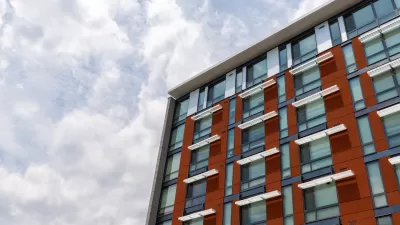A new study from the Lincoln Institute of Land Policy makes the case for well-timed, thoughtful use of inclusionary zoning as a tool to support diverse, affordable communities.

A post by Anthony Flint on the Lincoln Institute of Land Policy website announces the release of a new report titled "Inclusionary Zoning: Creating and Maintaining Equitable Communities." As noted in the post, debates about inclusionary zoning are raging in cities all over the country. The new report by the Lincoln Institute of Land Policy endeavors to "[separate] myth from fact, charting a path forward for policymakers and showing how inclusionary housing can be used effectively to reduce economic segregation."
More specifically, according to Flint, "author Rick Jacobus of Cornerstone Partnership offers solutions for overcoming the major political, technical, legal and practical barriers to successful inclusionary housing programs," after providing a review of literature and case studies.
Randy Billings already picked up on the news of the new report for the Portland Press Herald, indicating the relevance of inclusionary zoning to housing policy in Maine's largest city. "The [Maine] City Council is also considering adopting an inclusionary zoning ordinance," reports Billings. "Even though the proposed ordinance received a negative recommendation from the Planning Board, several councilors continue to support the proposal, which they will take up at a meeting in October."
FULL STORY: Making inclusionary housing work

Alabama: Trump Terminates Settlements for Black Communities Harmed By Raw Sewage
Trump deemed the landmark civil rights agreement “illegal DEI and environmental justice policy.”

Planetizen Federal Action Tracker
A weekly monitor of how Trump’s orders and actions are impacting planners and planning in America.

The 120 Year Old Tiny Home Villages That Sheltered San Francisco’s Earthquake Refugees
More than a century ago, San Francisco mobilized to house thousands of residents displaced by the 1906 earthquake. Could their strategy offer a model for the present?

In Both Crashes and Crime, Public Transportation is Far Safer than Driving
Contrary to popular assumptions, public transportation has far lower crash and crime rates than automobile travel. For safer communities, improve and encourage transit travel.

Report: Zoning Reforms Should Complement Nashville’s Ambitious Transit Plan
Without reform, restrictive zoning codes will limit the impact of the city’s planned transit expansion and could exclude some of the residents who depend on transit the most.

Judge Orders Release of Frozen IRA, IIJA Funding
The decision is a victory for environmental groups who charged that freezing funds for critical infrastructure and disaster response programs caused “real and irreparable harm” to communities.
Urban Design for Planners 1: Software Tools
This six-course series explores essential urban design concepts using open source software and equips planners with the tools they need to participate fully in the urban design process.
Planning for Universal Design
Learn the tools for implementing Universal Design in planning regulations.
Clanton & Associates, Inc.
Jessamine County Fiscal Court
Institute for Housing and Urban Development Studies (IHS)
City of Grandview
Harvard GSD Executive Education
Toledo-Lucas County Plan Commissions
Salt Lake City
NYU Wagner Graduate School of Public Service





























